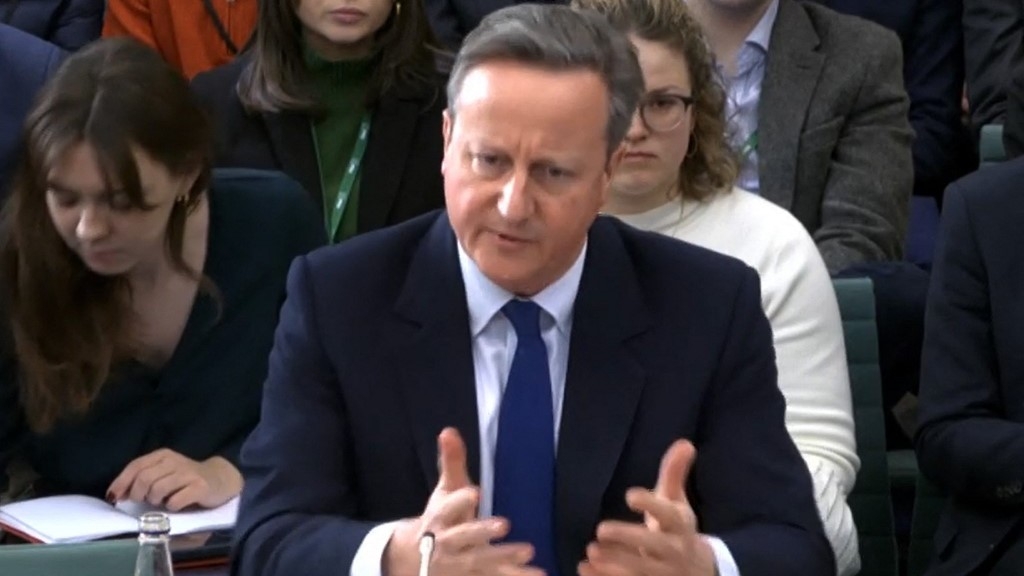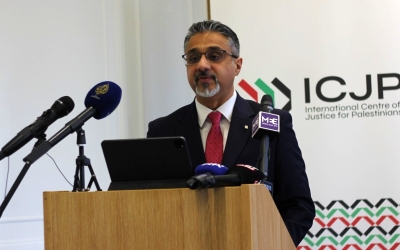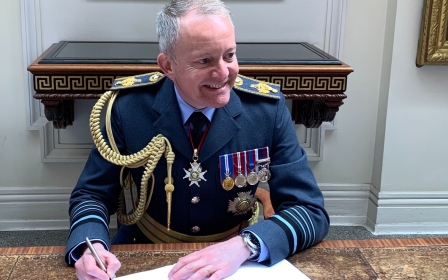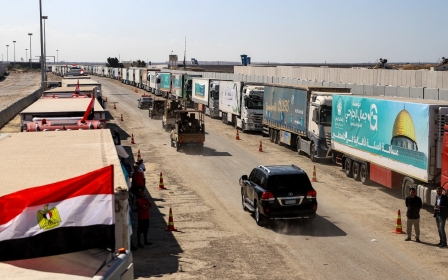War on Gaza: UK's Cameron okayed arms sales to Israel despite Foreign Office legal concerns

UK Foreign Secretary David Cameron recommended British arms sales to Israel despite "serious concerns" in the Foreign Office that it had breached international law in Gaza, according to a government document filed in the High Court.
The document, which has been reviewed by Middle East Eye, was filed by the government in its defence to a challenge brought by legal and human rights groups attempting to stop UK arms sales to Israel for its ongoing campaign in Gaza.
At least 24,620 people have been killed and 61,830 wounded, with an estimated 70 percent of the enclave’s civilian infrastructure destroyed since 7 October.
The 22-page defence lays out the findings of the Foreign, Commonwealth, and Development Office unit that assessed Israel's commitment and capability to comply with international humanitarian law (IHL) and advised Cameron.
In multiple reports between 10 November and 8 December, the unit raised several concerns about Israel's compliance with the law, according to the court filing.
New MEE newsletter: Jerusalem Dispatch
Sign up to get the latest insights and analysis on Israel-Palestine, alongside Turkey Unpacked and other MEE newsletters
The unit appears to have been satisfied on some counts, after Israeli officials responded to detailed questions from the Foreign Office about their conduct in a 26 November report in which, among other points, they insisted the Israeli military had incorporated IHL "into all aspects of military operations".
But other points, including a lack of Israeli response about "the reasons for restricting the quantity of supplies of food, water, and medical supplies", raised concerns for the unit, but were attributed to different interpretations of the law.
Israel's position, the unit noted, was that it was "acting in accordance with what it believes to be the relevant legal obligations in relation to humanitarian assistance", according to the filing.
"It is, therefore, possible that this is a case of disagreement about what the law requires rather than an intentional disregard of IHL," the document says.
The revelations in the document come a week after Cameron told the parliamentary Foreign Affairs Committee that he could not "recall every bit of paper" put in front of him and it was not his job to make a "legal adjudication" when asked if government lawyers had advised him that Israel had breached the law.
Follow our live blog for all the latest on the Israel-Palestine war
However, the document shows that the final decision of whether Israel was committed to complying with the law was left to Cameron.
"While there remain incidents on which we do not have sufficient information from which to draw a conclusion on compliance... in light of the information received and other inquiries undertaken, we are satisfied that we do have sufficient information on compliance to inform our overarching view of Israel's compliance," the unit concluded, noting that "the assessment on commitment is subject to a ministerial decision".
The Export Control Joint Unit - a cross-departmental body that oversees UK's export controls and licensing for military and dual-use items - told Cameron on 8 December that he had three options when it came to advising whether export licenses for sales to Israel should be approved.
He could either not suspend them, but keep them under careful review; suspend where it was assessed items might be used to carry out Israeli military options in the conflict in Gaza; or suspend all licenses.
Cameron decided on 12 December that he was satisfied Israel was committed to complying with international humanitarian law, according to the filing.
He advised the Trade and Business Secretary Kemi Badenoch not to suspend export licenses for UK arms sales to Israel, which she followed.
'Taken their word for it'
Labour MP Zahra Sultana, who has proposed legistlation to suspend arms sales to any country where there is a risk they might be used in violation of international law, said it was "utterly outrageous" that the government continued to arm Israel despite "the overwhelming evidence of Israeli war crimes in Gaza".
"These documents expose that, whilst ministers were giving public reassurances about Israel's compliance with international humanitarian law, in private there were major concerns in the Foreign Office about Israel's behaviour," Sultana said.
Dearbhla Minogue, a lead lawyer with the Global Legal Action Network, one of the groups that are challenging the government at the High Court, said the UK's response has "made it clear that they have not stood back and looked at all of the evidence objectively".
Instead, she said, they have "gone to the perpetrator, asked whether they are violating international law, and taken their word for it".
According to the UK-based Campaign Against Arms Trade, the British government has licensed at least £472m worth of military exports to Israel since May 2015.
The true figure is likely much higher because it doesn’t include items sold under opaque open licences which keep the value of arms and their quantities secret.
British companies provide around 15 percent of the components of the F35 stealth combat aircraft which Israel has used to bomb Gaza in the past three months.
A Department for Business and Trade spokesperson told Middle East Eye: “The UK supports Israel’s legitimate right to defend itself and take action against terrorism, provided it is within the bounds of International Humanitarian Law."
“All our export licences are kept under careful and continual review and we are able to amend, suspend or revoke extant licences, or refuse new licence applications, where they are inconsistent with the UK’s Strategic Export Licensing Criteria.”
MEE has asked the Foreign Office for comment.
Middle East Eye delivers independent and unrivalled coverage and analysis of the Middle East, North Africa and beyond. To learn more about republishing this content and the associated fees, please fill out this form. More about MEE can be found here.





